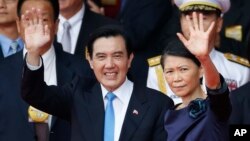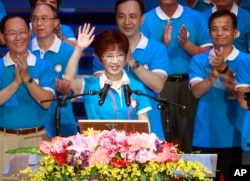Taiwan’s president warned his successor Saturday against turning back today’s upbeat relations with old rival, China. The current Taiwan government has eased once dangerously tough relations with Beijing since 2008, but next year’s presidential election could change that course.
Taiwan President Ma Ying-jeou used his final National Day holiday in office Saturday to warn whoever takes the reins in May not to scrap the progress made in relations with China. Ma must step down then due to term limits after eight years.
According to opinion polls in Taiwan, opposition Democratic Progressive Party Chairwoman Tsai Ing-wen is expected to win the January 16 election. She disputes today’s condition for dialogue with China, which binds both sides in principle to a single country.
The president said in a televised speech Saturday that the condition for dialogue is part of Taipei’s constitution and should not be scrapped. He says that backdrop has sustained talks with Beijing and allowed for landmark agreements, a shift from the icy relations with China before his term.
Status quo
He argues that today the majority of people in Taiwan want to maintain the status quo. But Ma asks whether we can maintain that status quo going forward. He says, to be honest, he is concerned. He adds that the current status quo did not just drop out of the sky and cannot be taken for granted.
China has claimed sovereignty over democratic, self-ruled Taiwan since the Chinese civil war of the 1940s, and demands eventual unification. Polls indicate 70 to 80 percent of Taiwanese people prefer today's level of autonomy. Tsai Ing-wen, the frontrunner in the presidential race, says she is open to dialogue with China as long as the two sides are not cast as a single country. Beijing does not accept that idea as a precondition for talks.
During Ma's term, Taiwan and China have set aside political differences to open first-ever high-level dialogue that has led to 23 agreements on trade, transit and investment.
Concerns about China
The president says Taiwan needs help from China's massive economy to ensure its own prosperity. But some Taiwanese worry that China will use economic links to push Taiwan toward unification against its will. Their voices helped the opposition sweep local elections last November and give it a lead in the presidential campaign.
When the opposition party ruled from 2000 to 2008 and advocated Taiwan's legal independence from China, Beijing fumed and occasionally threatened use of force. The two sides were not able to reach any deals. Tsai has not proposed conditions that Beijing's communist leadership accepts.
The ruling Nationalist Party candidate, Hung Hsiu-chu — a pro-China legislator — is expected to end her bid for the presidency later this month as she lags the opposition candidate in opinion polls by around 20 percentage points. The party would pick a new candidate and likely one who favors the current president's China engagement policies.





